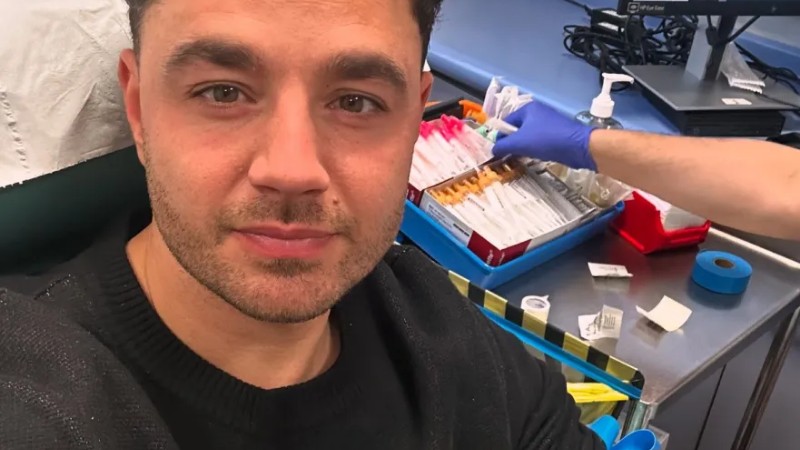Heart failure (HF) is a growing concern in the United States, affecting millions and contributing to hundreds of thousands of deaths each year. Effective management of this chronic condition is crucial in reducing hospitalizations and improving patient outcomes.
OSF HealthCare Saint Anthony’s Health Center has taken a significant step in enhancing cardiac care by performing its first implantation of the Abbott CardioMEMS™ HF System. This innovative, FDA-approved device enables remote monitoring of heart failure patients, allowing for early intervention and reducing emergency visits.
A 73-year-old Riverbend region resident became the first patient at OSF Saint Anthony’s to receive the CardioMEMS implant, marking a milestone for the hospital’s Heart Center. Through a collaborative effort with SLUCare Physician Group and SSM Health, OSF Saint Anthony’s is bringing advanced cardiovascular care to the community, ensuring patients receive specialized treatment close to home.
Key Takeaways
OSF Saint Anthony’s Health Center has introduced the CardioMEMS HF System to remotely monitor heart failure patients, reducing hospitalizations and improving outcomes.
- The CardioMEMS HF System is the first FDA-approved device for remote heart failure monitoring, reducing hospital admissions.
- The system measures pulmonary artery pressure, allowing for early intervention and medication adjustments before severe symptoms develop.
- OSF Saint Anthony’s collaboration with other health groups ensures advanced cardiac care is accessible to local patients, improving their quality of life.
Understanding heart failure and its impact
Heart failure occurs when the heart is unable to pump blood efficiently, leading to fluid buildup in the lungs and other organs. The condition can be classified into two main types.
Heart failure with reduced ejection fraction (HFrEF): The heart muscle weakens and cannot effectively circulate blood.
Heart failure with preserved ejection fraction (HFpEF): The heart maintains its pumping ability but experiences stiffness, leading to fluid retention and complications.
Common causes of heart failure include prolonged high blood pressure, heart attacks, congenital heart defects, and valvular heart disease. Symptoms such as shortness of breath, swelling in the legs or abdomen, fatigue, rapid weight gain, and irregular heartbeat indicate worsening heart function.
The American Heart Association (AHA) and the Heart Failure Society of America (HFSA) estimate that around 6.5 million adults in the United States are affected by heart failure. Among them, around 600,000 individuals experience advanced stages of the condition, requiring specialized care. Each year, heart failure contributes to more than 350,000 deaths, highlighting the significant impact of this chronic disease on public health.
Traditional management of heart failure relies on lifestyle changes, medications, and frequent hospital visits for monitoring. However, repeated hospitalizations indicate that conventional approaches may not be sufficient for some patients. This is where the CardioMEMS™ HF System plays a crucial role.
CardioMEMS™ HF System and patient care
The CardioMEMS™ HF System is the first FDA-approved heart failure monitoring device clinically proven to reduce hospital admissions. The system consists of a small, wireless sensor, approximately the size of a paperclip, that is implanted into the patient’s pulmonary artery through a minimally invasive catheterization procedure. Once in place, the device continuously measures pulmonary artery (PA) pressure, a key indicator of fluid retention and worsening heart failure.
Remote monitoring for proactive treatment
Unlike traditional monitoring methods that require in-person visits, the CardioMEMS sensor allows for daily remote readings. Patients lie on a specialized pillow at home, which transmits pressure data wirelessly to a secure system accessible by their healthcare team. This real-time information enables cardiologists to detect subtle changes in heart function and make necessary medication adjustments before severe symptoms develop.
Dr. Kishore Harjai, an interventional cardiologist who led the implantation procedure, explains that remotely monitoring pulmonary artery pressure allows for early intervention before symptoms appear. This proactive approach helps prevent hospitalizations and significantly improves the patient’s quality of life.
For the 73-year-old patient at OSF Saint Anthony’s, life before the implant was a cycle of hospital admissions due to fluid retention. Each time, he required IV treatments and medication adjustments before being discharged. Since receiving the implant in late January, he has not required a single emergency visit, marking a dramatic improvement in his health management.
Eligible patients for CardioMEMS
The CardioMEMS™ HF System is authorized for patients with New York Heart Association (NYHA) Class III heart failure, meaning they experience symptoms even during everyday tasks. To qualify, patients must have been hospitalized for heart failure at least once in the previous year.
Early detection and intervention can help slow the progression of heart failure, reducing the frequency of hospital stays and enhancing the patient’s overall well-being.
OSF Saint Anthony’s cardiac care commitment
The successful implantation of the CardioMEMS device at OSF Saint Anthony’s is part of a broader initiative to expand access to specialized cardiovascular treatment. Through its partnership with SSM Health and SLUCare Physician Group, the hospital is enhancing its ability to provide cutting-edge cardiac care in the Riverbend region.
Collaboration with leading cardiology experts
The procedure was led by Dr. Kishore Harjai, a board-certified interventional cardiologist and chair of the Department of Cardiology at SSM Health Saint Louis University Hospital. His expertise spans structural and interventional cardiology, including minimally invasive procedures like transcatheter aortic valve replacement (TAVR) and complex coronary stenting.
Laurinda Harjai, DNP, FNP, RN-BC, of OSF Medical Group – Cardiology (Alton), leads the patient’s post-procedure care, ensuring ongoing monitoring and medication adjustments. The seamless coordination between specialists ensures patients receive high-quality, personalized treatment.
A focus on preventative and sustainable care
Zach Yoder, president of OSF Saint Anthony’s, emphasizes the importance of investing in advanced cardiology programs to meet the needs of local patients.
Yoder emphasizes the importance of a strong cardiology specialty program for hospitals of all sizes, regardless of location. He highlights that the collaboration with SLUCare Physician Group allows the Riverbend region to access exceptional medical and surgical cardiologists.
By incorporating innovative solutions like CardioMEMS, OSF Saint Anthony’s is shifting toward a preventative healthcare model, where early intervention reduces long-term complications and improves patient outcomes.
The future of heart failure treatment
The introduction of the CardioMEMS™ HF System at OSF Saint Anthony’s represents a significant advancement in the way heart failure is managed. Remote monitoring allows for early detection of worsening symptoms, reducing emergency visits and improving overall patient care.
The growing role of digital health in cardiology
With the rise of digital health solutions, more hospitals are integrating remote patient monitoring systems to enhance chronic disease management. Devices like smart ECG monitors, implantable defibrillators, and AI-powered diagnostic tools are becoming more prevalent, enabling cardiologists to deliver personalized, data-driven care.
The success of CardioMEMS highlights the potential of telehealth and remote monitoring in reducing healthcare costs and improving quality of life. As more hospitals adopt these technologies, the standard of heart failure treatment will continue to evolve.
Patient-centered approach to heart failure management
For the 73-year-old Riverbend resident, CardioMEMS has provided peace of mind and an improved quality of life. With fewer hospital visits, he can focus on daily activities without the fear of sudden health issues. Dr. Sands, chief medical officer at OSF Saint Anthony’s, emphasized the procedure’s success, noting that the patient has not required a return visit to the emergency department, which has significantly eased his life.
The first CardioMEMS™ HF System implant at OSF Saint Anthony’s marks a significant milestone in heart failure management. By leveraging remote monitoring technology and expert collaboration, the hospital is improving patient care, reducing emergency visits, and setting a new standard for advanced cardiac treatment in the Riverbend region.
As digital health continues to transform cardiology, OSF Saint Anthony’s remains committed to integrating innovative solutions that prioritize early intervention, long-term wellness, and patient-centered care. With the success of this first implant, more patients will soon benefit from a proactive approach to heart failure treatment, leading to healthier lives and fewer hospitalizations.














